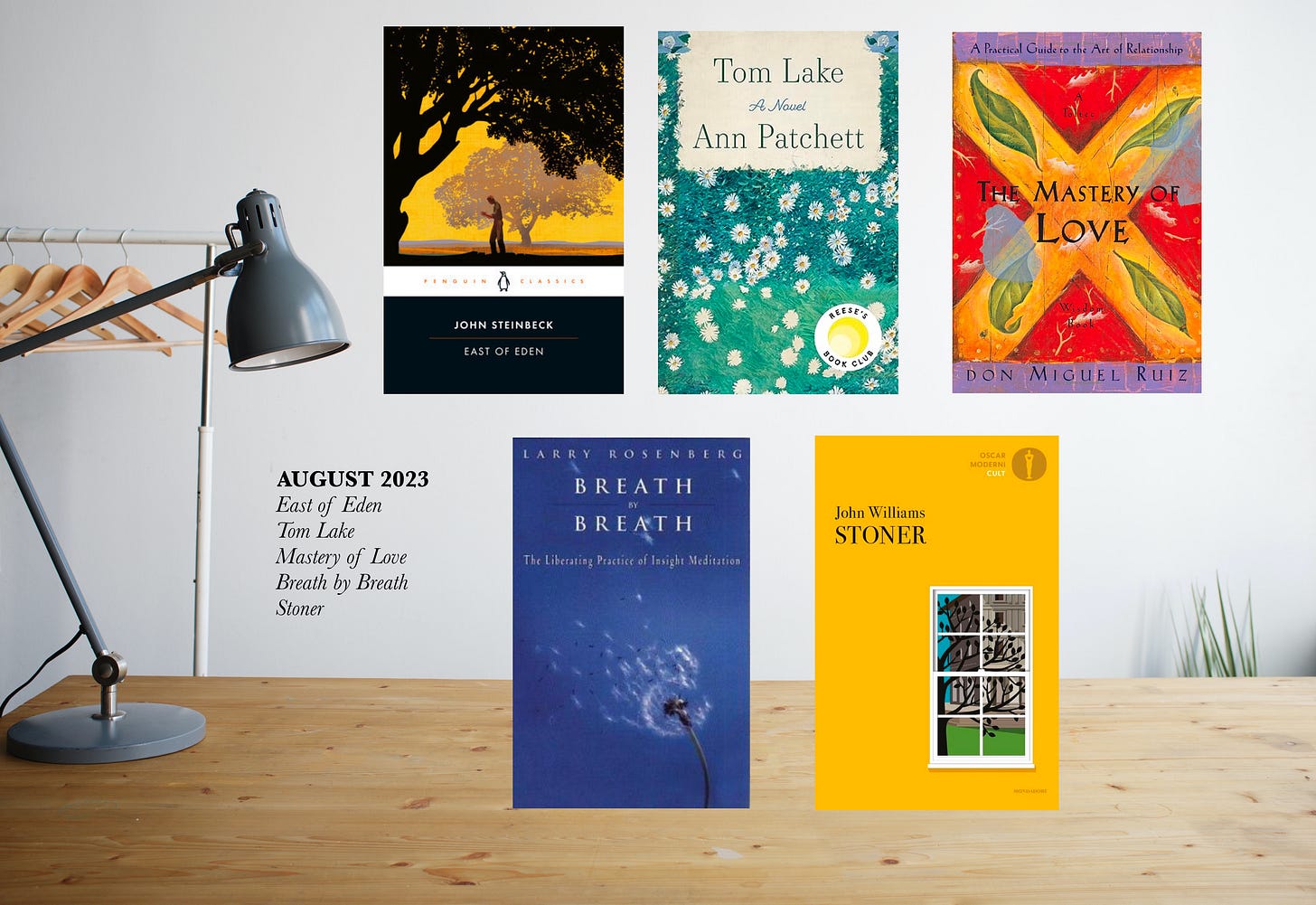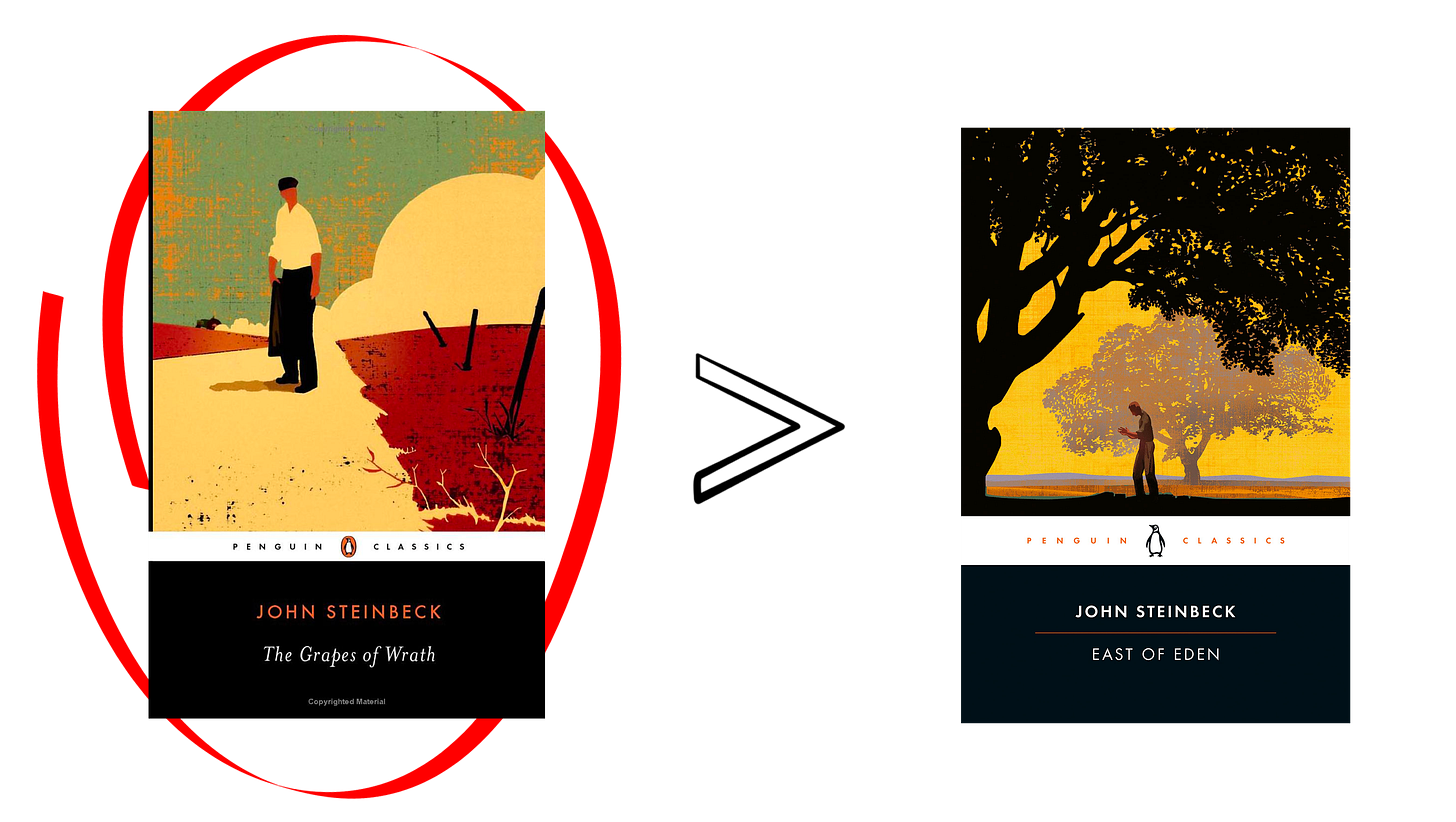📚Reading Stack for August 2023
a steinbeck 🐐, a pair of mystics, a meryl streep audiobook, an underrated gem
Is philosophy dead?
The first thing I do in the morning is read. Though y’all know how I feel about the power of stories, it’s usually that genre which some people view as a waste of time, as mental masturbation for old dudes in armchairs. Philosophy. In the last few years, however, we’ve seen the genre be reframed according to its original purpose.
If self-help books teach us how to help ourselves, philosophy helps us identify what kind of help we need.1
If you’re curious, 👉here’s an example from Wednesday morning. 2
While I still think fiction is the surest way to widen one’s perspective, all types of literature have their own value to me. A few reasons why I read:
Philosophy: see myself more clearly
History: see the past (and present) more clearly
Science: see the world more clearly
Fiction: see others’ experiences more clearly
Poetry: see the beauty and meaning in the details
Anyway, I’m helping teach a Sophomore literature lecture this fall, so there’ll be plenty philosophizing in the months to come.
📚 And now, the books.
1. East of Eden by John Steinbeck
My Steinbeck obsession started started about six months ago with Grapes of Wrath, which Dan and I read and discussed for the podcast. I won’t bury the lead:
While Steinbeck describes East of Eden as his “most important work,” it doesn’t even approach Grapes, in my mind. Often, when a person takes a creative task too seriously3, there’s a sort of downward pressure that obstructs the artist’s creative flow, and he/she usually comes up short of expectations.4 In the words of one sagely surf instructor, “the less you do, the more you do.”
Still, how much I loved this book speaks to his writing powers. Even in his fourth or fifth best book, Steinback was able to capture, channel, and propagate the power and simplicity of a primordial myth. In many ways, the story is a retelling of the biblical story of Adam and Eve, as well as the poisonous rivalry of Cain and Abel. On the surface, however, the story is set in California’s rich Salinas Valley farmlands; this brutal yet sprawling novel entangles the destinies of two fascinating families—the Trasks and the Hamiltons. Even if East of Eden is not his best, I’ll be lucky to write anything this good.
Want to learn more before diving in?
2. Tom Lake by Anne Patchett
In his masterclass, David Sedaris called Patchett’s memoir, The Getaway Car, one of his all time favorite books on writing. It’s still in the spooky unread corner of my library, but when I saw that Tom Lake’s audiobook was narrated by Meryl Streep, I took the plunge.
Tom Lake is told from the viewpoint of Lara, a retired actress with three daughters who are, due to covid, back home on the family’s orchard. To pass the time, they beg their mother to retell her experience in the acting/Hollywood world, and her tumultuous romance with one of the most famous actors in the world. Because of its theatrical themes, the book carries a light, fun, stock-summer-theater feel, and is at once light and thoughtful. At its core, the novel is a meditation on young love, marriage, and the lives of parents before children. Part hopeful, part melancholy, Patchett’s narrative is a rich, subtly emotional story, exploring the various forms that happiness can take even when the world is falling apart. No surprise she is one of today’s most respected working novelists.
3. Mastery of Love by Don Miguel de Ruiz
My first interaction with Don Miguel de Ruiz work was as negative (and judgmental) as it gets. I was in the den of my Aunt’s home in Brooklyn, sun pouring through the front windows, her paints and easels and brushes backlit to a crisp morning blue. On my lap was the copy of The Four Agreements I’d plucked from the shelf. Though many call it “their favorite book,” I was completely and utterly flummoxed by this claim. Favorite book! What! This over-spiritualized drivel is the favorite of these people who are smarter, wiser, more sensible than I? Four years later, at the recommendation of a friend, I picked up by this book by the same author… only to find myself completely and utterly rapt.5
I thus began to wonder about timing. Sometimes we pick a book up and can’t get through it, only to be obsessed a few years later. Part of me wonders if writing of this kind is like greek yogurt, beer, wine, coffee, Brussels sprouts, grapefruit, brie, and reality television—an acquired the taste.
Having finished and enjoyed it, I don’t think I “acquired the taste,” but acquired the need.
There’s a reason she recommended the book to me: I needed it.
Mastery of Love is a book about:
the ways that control erodes relationships (of all kinds)
perfection as a damning illusion
why humans hunt for external love to cope with internal hurt
forgiveness, acceptance
To some, the book’s language could come across as negative and self-defeating, but I did not see it this way. We all carry limiting, fear based beliefs; we all make assumptions that undermine our ability to love; we all create drama and suffer in our interpersonal relationships. We also, however, all have what it takes to heal our emotional wounds, recover the freedom we had as children, and restore the spirit of playfulness, joy, and care that is vital to a loving relationship—with the self and with others.
To those of you who have read Don Miguel de Ruiz, what do you think? I’m genuinely curious:
4. Breath by Breath by Larry Rosenberg
Today, there’s a popular Scientist-turned-Buddhist archetype that people gravitate toward6. In a world that puts Science and Technology on a pedestal, it’s alluring to hear the tenets of eastern philosophy come not from monks in brown robes, but from the most learned in western science. This is the point you might be expecting me to launch into a critique of why trusting anything (including science) deeply and dogmatically is harmful and reductive—but y’all don’t pay me enough to write that essay. Lol. Truth is, I too appreciate being taught what was once considered ‘woo-woo’ from neuroscientists and molecular biologists. That said, when it comes to bringing Eastern philosophy to the west, there’s a place for both eastern and western teachers.7
I hadn’t heard of Larry Rosenberg until recently and was quite impressed by this book. Rosenberg believes that freedom from suffering is not only possible, but doable. And with simple means available to us at all times—the breath. First, he retells the Buddha’s 2,500-year-old teaching, with an emphasis on cultivating both tranquility and deep insight through the full awareness of breathing. Then, with humor, metaphor, and light hearted wisdom, Rosenberg shows the reader how a simple, basic, un-mystical awareness of breath can quietly, quickly, and profoundly transform our lives.
5. Stoner by John Edward Williams
Talk about underrated, Stoner is the Office Space of 20th century novels. Though very few associate the name John Williams with exceptional novelists, this 20th century professor is a true cult classic. He only wrote four books, two of which are considered timeless classics. Augustus, which I plan to read soon, is a fictionalized epistolary retelling of the great Roman emperor Augustus Caesar’s life. Stoner is quite different. The novel’s unlikely existential hero, William Stoner, is a farmer turned English professor who acts as a poster-child for the conflicting, unforgiving realities of presented by the promise of America. Dan has been urging me to read John Williams for some time, and this book did not disappoint. Unlike some books whose details grow dim with time, Stoner has, like that bottle of wine mentioned above, gotten better. I won’t say much more than Stoner is a lucid, moving, unsung work bordering perfection. But if you love literature, I’d recommend finding out for yourself.
Or at least listen to the episode on Good Scribes Only pod before diving in 🥲
Years ago,
I had a realization that freed me up to explore books of all kinds, not just the greats. It occurred to me that no matter how much time I dedicate to reading, I won’t come close to reading all the great books out there. Though reading time gets more scarce every day, committing to a life of books has led me to view reading as a privilege and a practice. Now, I pickup whatever sounds compelling, and write whenever I can free up a moment.
Books are magic. Learning is magic. And my biggest wish is that you treat your mind with the books it deserves.

Venga, amigos! That’s all for now.
Feel free to email me questions or thoughts for discussion, should any come to mind. Likewise, if you have a good book to recommend, please pass it along. It’s always great to hear back, especially if one of these books comes to mean something to you.
—J
Next month:
Anne of Green Gables by Lucy Maude Montague
The Dhammapada by Eknath Easwaran
Consider the Lobster by David Foster Wallace
Play It As It Lay by Joan Didion
Dao de Jing by Laozi
For example: Aristotle on how to live “the good life.” Epicurus on love, justice, and the human experience. Douglas Harding on the illusion of self.
If you can decode my hieroglyphic handwriting :)
Write the great American novel, make the film of the generation, record the album of the era, etc….
The same happened to Scott Fitzgerald, as discussed in last months stack / podcast
I’m curious how I would feel about The Four Agreements if I return to it now. I’m reminded of the Heraclitus quote: No man ever steps in the same river twice, for it's not the same river and he's not the same man. There is nothing permanent except change.
Sam Harris, Jon Kabat-Zinn, Jack Kornfield, etc…
That said, there are eastern teachers—like Thich Naht Hanh, Chogyam Trungpa Rinpoche, J Krishnamurti, and Ayya Khama— whom I’ve read everything I could get my hands on.








